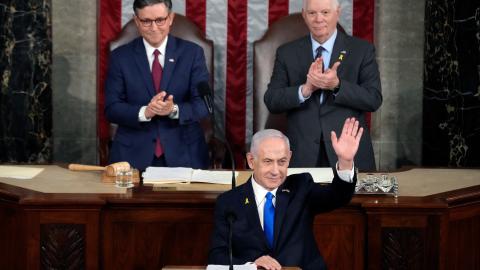In his speech to Congress, Israeli Prime Minister Benjamin Netanyahu underscored the threat that Iran poses to the Middle East and advocated for the formation of an anti-Iran “Abraham Alliance.” Netanyahu’s remarks shed light on the common and unaddressed denominator of the security challenges the United States faces in the Red Sea, Africa, and Ukraine: the Islamic Republic’s expansionism.
“In the Middle East, Iran’s axis of terror confronts America, Israel, and our Arab friends,” said Netanyahu. The Houthi militia’s terror campaign against Red Sea shipping, allegedly in solidarity with Hamas against “the Zionist entity,” has damaged the interests of America’s Middle East allies. Egypt’s revenue from the Suez Canal declined 40% at the beginning of 2024 compared to the previous year, worsening the country’s already precarious economic situation.
Beyond the Middle East, Iran has made significant inroads in Africa – and bolstered its nuclear program in doing so. The Islamic Republic – which is “probably one or two weeks away” from being able to produce enough fissile material for a nuclear weapon, according to US Secretary of State Antony Blinken – has signed a uranium deal with the Tehran-supported regime in Niger. Additionally, Tehran backs the Polisario Front, which attacks Morocco in the Western Sahara and threatens the interests of America’s Gulf allies by funneling weapons to a bloody civil war in Sudan.
The Islamic Republic’s ambitions, however, are not limited to its training and support of a network of regional proxies. Tehran has also cultivated a military partnership with Russia to undermine the US-led global order. After a visit to Russia in October 2022, Iranian diplomats commented that “the Russians had asked for more drones and Iranian ballistic missiles with improved accuracy.”
Tehran seized the opportunity to dominate the Russian market and began with a joint Shahed drones production site in Tatarstan. By doing so, Khamenei killed two birds with one stone. He solidified Putin’s friendship and made sure that IRGC’s militias and proxies would remain well-armed.
More importantly, and contrary to popular belief, Tehran’s attacks on Israel in April have, in fact, achieved an important political goal. Though the US and partners like Jordan demonstrated cooperation by repelling most of the over 200 drones and missiles, Tehran gained valuable intelligence for its drones; learned how to quickly assemble its proxies in Lebanon, Iraq, and Yemen; gauged the reaction of US allies in the region; and, most importantly, saw that America would not punish Iran for attacking its ally.
Beyond improving its military capabilities by directly confronting the US and weakening its allies, Iran’s relationship with China and Russia has improved, helping the Islamic Republic in international forums. Following the attacks, Russian Foreign Minister Sergey Lavrov reiterated his condemnation of the Israeli airstrike on the Iranian consular office in Damascus and described it as “political killing.” Chinese Foreign Minister Wang Yi declared that “China has noted Iran’s statement that its action taken was limited and was an act of self-defense.”
By defying the US-led global order, Iran has also gathered political support that could shift the UN Security Council in its favor. When President Joe Biden advised Netanyahu to “take the win” following Iran’s thwarted attack on Israel, he failed to consider that Iran had achieved these numerous goals.
Netanyahu’s proposal to establish an “Abraham Alliance” is pragmatic. The US-led efforts to normalize relations between Israel and its Arab neighbors have been jeopardized by a US foreign policy that does not address Iran’s increasing influence over the Middle East. Iran is on the path of fortifying its offensive-dominant regime, and Israel is not the only one at risk.
In addition to helping Israel consolidate its links with neighbors who share its determination to counter the Islamic Republic’s actions, the Abraham Alliance will be crucial in undermining a disruptive force whose actions imperil the national security of the United States.
Especially since Iran has utilized its political gains in the region to influence US-Israel relations, John Kirby, White House national security communications advisor, said that “Iran has been funding and encouraging some of the protest activity here in the US.”
The next administration should abandon the framing of the Gaza war as an Israeli-Palestinian conflict, encourage an Abraham Alliance, and adopt Netanyahu’s view that the region is engaged in a greater battle where the US-led order opposes the Islamic Republic’s ambitions, and Hamas’s actions are just the tip of the iceberg.
Enjoyed this article? Subscribe to Hudson’s newsletters to stay up to date with our latest content.















